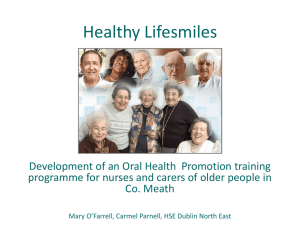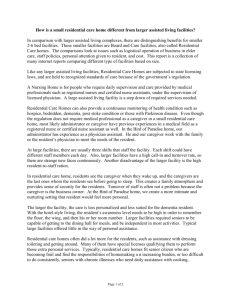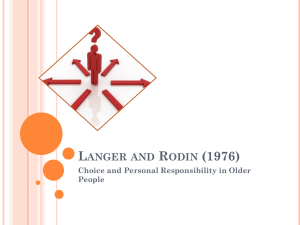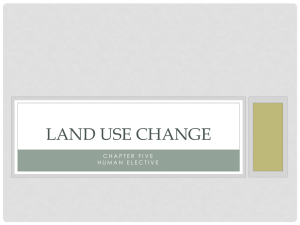Draft National Standards for Residential Care Settings for Older
advertisement
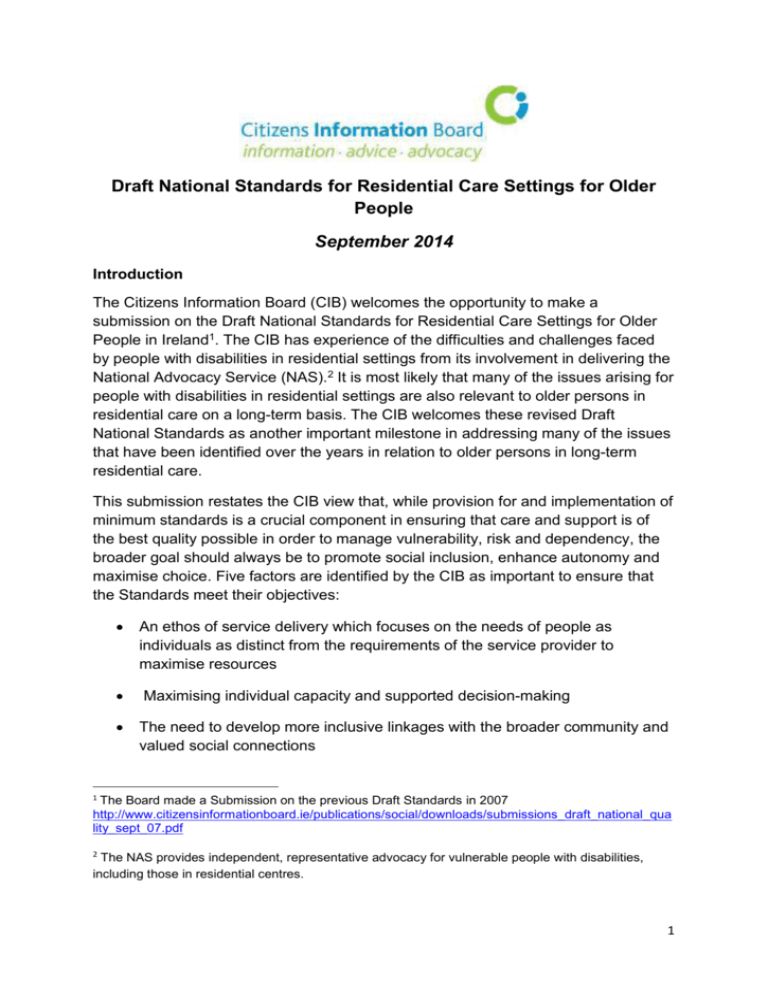
Draft National Standards for Residential Care Settings for Older People September 2014 Introduction The Citizens Information Board (CIB) welcomes the opportunity to make a submission on the Draft National Standards for Residential Care Settings for Older People in Ireland1. The CIB has experience of the difficulties and challenges faced by people with disabilities in residential settings from its involvement in delivering the National Advocacy Service (NAS).2 It is most likely that many of the issues arising for people with disabilities in residential settings are also relevant to older persons in residential care on a long-term basis. The CIB welcomes these revised Draft National Standards as another important milestone in addressing many of the issues that have been identified over the years in relation to older persons in long-term residential care. This submission restates the CIB view that, while provision for and implementation of minimum standards is a crucial component in ensuring that care and support is of the best quality possible in order to manage vulnerability, risk and dependency, the broader goal should always be to promote social inclusion, enhance autonomy and maximise choice. Five factors are identified by the CIB as important to ensure that the Standards meet their objectives: An ethos of service delivery which focuses on the needs of people as individuals as distinct from the requirements of the service provider to maximise resources Maximising individual capacity and supported decision-making The need to develop more inclusive linkages with the broader community and valued social connections 1 The Board made a Submission on the previous Draft Standards in 2007 http://www.citizensinformationboard.ie/publications/social/downloads/submissions_draft_national_qua lity_sept_07.pdf 2 The NAS provides independent, representative advocacy for vulnerable people with disabilities, including those in residential centres. 1 Meaningful individual care and support plans that include provisions for both health care, life-style and maintaining social networks as desired by the resident or, where appropriate, someone speaking on his/her behalf An enhanced role for independent advocates as part of an integrated residential care service The submission contains two sections. Firstly, some general observations are made in respect of the importance of quality of life considerations, the implications of a rights-based approach in the context of residential care provision and the role of advocates. The second section makes comments and suggestions in response to the specific consultation questions. 2 Section One: General Considerations Quality of Life An important finding of TILDA (The Irish Longitudinal Study on Ageing), highlighted by McKeown et al. (2014)3, is the significance of social connectedness as a key to well-being for older people. “Social connections, in the broadest sense, have a particularly large influence on personal well-being among older people” (McKeown et al.:17). Such connections typically involve the quality of relationships with partners, children, relatives and friends. Enhancing well-being can, of course, be particularly challenging in the case of people who are socially isolated and outside of networks of social engagement, information and supports. This is a key consideration for people in long-stay residential care and one which should underpin the development and implementation of quality standards. Quality of life domains include physical health, psychological and emotional wellbeing, level of independence, social relationships and relationship to the environment in which people live. Quality of life domains for people with dementia have been identified as: (i) competent cognitive functioning; (ii) the ability to perform activities of daily living (ADL); (iii) the ability to engage in meaningful use of time; (iv) social behaviour; and (v) achieving a favourable balance between positive emotion and the absence of negative emotion.4 Research5 on the quality of life of people with cognitive impairment in nursing homes found that what residents valued most were: Contact with family members Intimacy and privacy Relationships with significant others Keeping active, feeling useful and having meaningful activities Religion, spirituality and prayer Positive interactions with staff members. Factors perceived to adversely affect quality of life in long-stay care included: McKeown K. , Pratschke, J.and Haase, T.(2014), Individual Needs – Collective Responses: The Potential of Social Enterprise to Provide Supports & Services for Older People: Assessment of National Business Case, Dublin: Fourth Age Trust. 4Suzanne Cahill and Ana Diaz, Living in a Nursing Home, Quality of Life: The Priorities of Older People with a Cognitive Impairment, in association with Dementia Services Information and Development Centre, http://dementia.ie/images/uploads/site-images/Quality-of-Life-in-Nursing-Homes.pdf 5 Op. cit. 3 3 Bereavement and loss, including loss of home and loss of lifestyle - many residents expressed an explicit desire to return home Lack of stimulation and boredom - the belief that there was nothing to do or nothing to look forward to in the nursing home The Standards should seek to enhance the valued aspects of residents’ lives and to address, as far as possible, the negative aspects. A Rights Approach The Standards reflect a general acknowledgement that older persons in residential care settings may be vulnerable, not only because of their needs, but also because historically the system of service provision has tended to be based on a dependency model rather than on an approach that maximises choice and independence. The Standards document makes a number of references to the rights of older persons, in particular, Standard 1.1 which states that “The rights and diversity of each resident are respected and safeguarded”. The need for residents to be well informed of their rights and supported in exercising their rights is stated as is the need to facilitate residents in accessing advocacy services and legal advice and representation where appropriate. While these are important provisions, there are three key relevant considerations which need to be taken into account. Firstly, residents are part of a wider community including the resident, his/her family, staff and wider social networks. A key question, therefore, is how the Standards can facilitate and support a person remaining an active and valued member of the broader community. This aspect of residents’ lives does not appear to be adequately addressed in the Standards. Secondly, the majority of older persons in residential care settings are vulnerable for reasons of dependency and reduced capacity to self-care which means that they frequently need assistance with maintaining and developing an appropriate social support infrastructure to enable them to assert their rights. This point may not be sufficiently well emphasised in the Standards. Thirdly, the need to ensure that people’s will and preferences are always fully respected is crucial from a rights perspective. The Role of Advocates There are a number of references in the Standards to the role of advocacy and the need to make provision for residents to have access to advocates. Clearly, there would need to be a significant increase in the number of advocates if the provision of advocacy as implied in the Standards, given that there are some 22,000 older persons living in nursing homes at present (a figure that is projected to increase 4 significantly in the coming years) and that almost 9 out of every 10 persons over 65 in nursing homes have a disability with a significant proportion of these have some form of dementia. It is thus clear that access to independent advocacy services for older people in residential services needs to be broadened if the requirements for advocacy support as set out in the Standards are to be met. It is also necessary to ensure that people who are decisionally autonomous but unable on their own to execute those decisions are fully supported to do so. Advocates can play a potentially important role in helping to ascertain the will and preferences of people who have difficulty on their own in articulating these. The respective different support roles of independent advocates, family members/friends and nursing home staff need to be stated explicitly. Since there is a significant resource issue here, there is a need for further exploration as to how the advocacy support role for older people in residential care settings might be developed and a need for a number of models to be put in place.6 6 The CIB is aware that Third Age is in the process of developing a nationwide programme of advocacy support for older persons. 5 Section Two: Addressing Specific Consultation Questions Do you think that all the areas you consider important are covered? Yes, in a general way all relevant areas are covered. However, more emphasis needs to be given to how the various Standards and Features can be realistically implemented in respect of people with significantly reduced capacity. Are the standards and features clear and easy to understand? In general, the standards and features are clearly stated. However, what is not clear is how service providers will know whether or not they are properly implementing the Standards without formal inspections by HIQA. It would be helpful if some Check Questions for use by service provider staff were included. Question 1: Is the language used clear? Overall, the language used in the Draft National Standards is clear. What is less clear, as stated above, is how service providers are to assess whether or not they are compliant in respect of many of the specific features. Also, there are some terms and definitions that need further clarification, e.g., ‘person-centred’; ‘representative’; ‘comprehensive assessment of need’; ‘restraint’; ‘adverse event’. The use of the term ‘person-centred’ throughout, while welcome, runs the risk of losing its essential meaning through over-use - the term needs to be defined as to what it means in practice. The term ‘representative’ needs to be defined to include different support roles that may be provided by a relative/friend (either informal or formal) and by an independent advocate or legal representative. Also missing is any reference to the role of an Enduring Power of Attorney where such exists and to the range of supported decision-making mechanisms set out in the Assisted Decisionmaking (Capacity) Bill 2013. The current definition of ‘Individual’s Representative’ (p.78) needs to be broadened. Comprehensive assessment of Need (Standard 2.1) There is a need for more detail as to what is involved in a ‘comprehensive assessment of need’ and who is responsible for carrying out the assessment. Some reference should be made to the Single Assessment Tool, based on InterRAI, being piloted by the HSE. Restraint While restraint is broadly defined in the Glossary, as “the intentional restriction of a person’s movement or behaviour without their consent” and while there are detailed features relating to restraint in Standard 3.6, it is not clear how a person’s right to 6 liberty under the European Convention on Human Rights and under Irish legislation 7 is to be protected. Adverse Event The definition of an ‘adverse event’ should be more comprehensive and should include self-harm, harm to another resident or staff member or serious damage to furnishings or the building. Question 2: Is the layout and design of the Draft Standards clear, easy to follow and understand? The changes in relation to terminology and lay-out from the previous Standards document provide a more integrated listing of standards components. The use of a thematic framework (8 themes and 35 standards) with stated features under each standard is helpful. However, some factors included in the 2009 Standards which are not included in the current document are relevant (see Response to Q.5 below). Also, while the outcomes set out the various ways a centre is expected to comply with a Standard, it would be useful if more cross-referencing between different standards and ‘features’ could be included. This would assist both centre staff and managers in navigating their way through what by its nature a very complex document. Also, some of the core relevant regulations might be included as an Appendix with cross-referencing in the main document. There should also be crossreferencing to the HIQA Guidance Documents as appropriate. Question 3: Do you feel that the order and structure of the Draft Standards is presented in a logical way for residential services for older people? Some cross-referencing between the Introductory Section (Summary of the Draft National Standards) to the relevant detailed Standards would be helpful with crossreferencing to relevant page numbers. Question 4: Do you feel that the Draft Standards will drive improvement in residential services for older people? The Draft Standards provide a valuable and necessary context for ensuring the delivery of high quality long-term residential care and support. On the face of it, it would appear that the implementation of such a comprehensive range of standards will be a significant change driver. However, their implementation will be both challenging and resource intensive. This suggests a need for some system of prioritisation over and above the minimum set of standards required by regulation in order to ensure consistency in quality of care. While all standards are clearly relevant, a question arises, for example, as to the respective importance from the perspective of residents of the standards relating to themes such as ‘governance 7 The Mental Health Act 2001 provides for the application of restraint where a person is suffering from a ‘mental disorder’. 7 and management’, ‘use of resources’ and ‘use of information’ and those relating to ‘person-centred care and support’, ‘effective services’ and ‘safe services’ Ideally, there is a need for more work on developing a system of auditing by service providers themselves in relation to how well they are meeting each ‘feature’ of each Standard. This raises significant logistical and resource questions. Question 5: Do you feel that all the important areas have been covered or are there any areas that should be included or excluded? The Standards are extensive and cover a wide range of daily living, organisational and administrative matters and this is very welcome. However, there are some gaps. Overall, there would appear to be insufficient attention given to people with reduced/ lack of capacity and how their participation can be optimised in terms of core concepts such as choice and individual planning and the safeguards required to ensure that their needs are fully met. While putting the resident rather than the service provider at the centre is a key implied underlying principle of the Standards, it is not clear how the concept of giving voice of residents with reduced capacity is to be implemented in practice. While the provisions of the Assisted Decision-making (Capacity) Bill 2013 have not yet been finalised, it is clear that they will have a significant bearing on the process of decision-making by people with reduced capacity. In particular, the Standards need to reflect the emphasis in the proposed legislation on taking account of people’s will and preferences. Therefore, a synthesis of the core provisions for supported decision-making in the Bill should be included and how these are to implemented. The 2009 Standards (18.2) refers to the need to give particular consideration to residents with dementia and other impairments, disabilities and communication difficulties when providing opportunities for participation in meaningful and purposeful activity. The Draft Standard 1.3.11, however, only mentions the needs of residents who have “difficulty communicating”. There should be a greater emphasis on the additional support needs of people with reduced capacity and/or with functional impairment. The 2009 criteria include a criterion (18.3) that a resident should be “enabled to live in a manner akin to his/her own home and the daily routines of the residential care setting, including meal times and bed times, are not solely dictated by staffing rotas”. These criteria are fundamental to the provision of a more communal kind of home care setting rather than a place where residents are provided with care. Consideration should be given to including this as a feature in the revised Standards. A criterion in the 2009 Standards (20.5) provides for residents to have access to radio, TV programmes, newspapers, magazines, information via computer and a 8 noticeboard. Provision for this aspect of daily living and social connectedness needs to be looked at again in the current Draft Standards. Also, the 2009 Standards include a criterion (25.11) that communal rooms and bedrooms rooms in nursing homes should be “domestic in character”. There is no similar standard or feature in the revised Draft Standards. This should be reinstated to support the person-centred approach adopted throughout the document. Consideration should be given to including a Standard or Feature around managing conflict– whether between residents, between a resident and staff, resident and family members and about options for appeal where a resident or his/her family or representative disagrees with management decisions. Question 6: Do you think these Draft Standards are applicable to residential services for Older People? The Draft Standards are most applicable to residential services and provide an important and necessary framework for the provision of care and support in accordance with individuals’ needs and preferences. However, their full implementation is likely to be very resource intensive and, for that reason, some further prioritisation may be required and a phased compliance implementation programme put in place. Question 7: What do you think would be the most useful format for the Draft Standards: hardcopy, electronic, audio, easy read, symbols, Braille or other? In order to ensure that the Standards are accessible to everyone (as they clearly should be), they should be available in all formats and in accordance with the Comhairle (Citizens Information Board) Access to Information for All: Guidelines on removing barriers and improving access to information for all.8 Question 8: Are there any specific areas covered in the Draft Standards which could benefit from further guidance? If yes, please list areas Given the many references to the role of advocates in the document (which is a centrally important one), more guidance is required in relation to the role of independent advocates and on how they are to be integrated into the service delivery system in residential care settings. There is a need for further guidance on how people’s right to have access to services such as physiotherapy, occupational therapy and speech and language therapy, which can significantly enhance functioning and independence, are to be 8 www.citizensinformationboard.ie 9 implemented in residential care settings. This is crucial in terms of implementing Feature 4.1.5.9 Specific themes Theme 1: Person Centred Care and Support 1.1.1: The following amendment is suggested: “The rights of each resident are protected and promoted in line with national and international legislation and UN and EU Conventions and Charters”. 1.1.5: The following amendment is suggested: “Each resident is facilitated in accessing advocacy services, and is provided with accessible information about his/her civil and social rights and entitlements and is supported in understanding his/her rights.” 1.7 Complaints The Complaints system as set out is very focused on procedures from a service provider perspective. More specific guidance would be useful around what a resident who has a complaint should do and who s/he should contact. Many people in residential centres may feel they cannot complain directly because they are too dependent on staff. In particular, there is probably little likelihood of people with reduced capacity being able to engage in the type of complaints procedure set out. The role of independent advocates here is, of course, crucially important. Theme 2: Effective Services Some reference should be made to the need for service providers to ensure that there is continuity of staffing/key support person for each individual given the fact that staff changes arising from retirement, people changing jobs and people taking maternity and other leave, may have a negative impact on some individuals if planning is not made for some transitions. 2.7.9: The following amendment is suggested: “Appropriate supports, including, for example, independent advocates and friendship circles, are available for residents to deal with issues such as loneliness and adjustment to a new environment”. 9 Feedback from Citizens Information Services has included references to people in nursing homes being unable to access services (e.g., physiotherapy) which they would have received if they lived in their own homes in the community. 10 Theme 3: Safe Services There is no ‘’feature’ dealing with what should be done in instances of abuse of one resident by another – the inclusion of such a feature should be considered. 3.1.3: This feature should be amended to include reference to the use of appropriate assistive communications technology and the involvement of an advocate. 3.1.10: The wording should be amended to “The person in charge ensures that residents have access to advocates and/or legal and financial advice…” Theme 4: Health and Wellbeing 4.2.10: There should be a requirement to have the views/perspectives of residents, their families/friends, representatives and independent advocates included in in the evaluation of the programme of activities. Theme 5: Leadership, Governance and Management 5.5.4: The review and consultation should involve representatives, advocates and friends as well as residents and families. Theme 6: Use of Resources Some Guidance should be provided on how available resources should be used to prioritise the most important Standards. Theme 7: Responsive Workforce 7.4.3: Some reference should be made to a requirement for specialist training in relation to supported decision-making, ascertaining people’s will and preferences, Advance Care Directives and end-of-life care planning. Theme 8: Use of Information Provision should be made for how information relating to Advance Care Directives is to be stored and accessed; There should be a mechanism in place for linking resident information with the Unique Health Identifier being developed; The question of developing and maintaining integrated linkages between information held by the residential service, by GPs and by acute hospitals should be explored further. The following additional Feature is suggested: 11 8.1.7: “There are effective technology links between the residential service, GPs in their area and acute hospitals in their catchment area so that key resident information is available in an integrated manner and in accordance with data protection legislation.” Are there any other general comments you would like to make? The Revised Draft Standards are an important milestone. Their implementation will no doubt present major logistical and resource challenges and will require ongoing capacity development by each service provider. In this regard, it should be stated explicitly that responsibility for implementing the National Standards for Residential Care Settings for Older People lies firmly with service providers and their staff. The Standards alone will not bring about change; they are, however, a foundation on which change can be built. The Standards offer a context within which a rights approach can be consolidated, thus ensuring an approach which should result in a more responsive and respectful care and support system for individual residents. Notwithstanding the many references to the term ‘person-centred’ throughout the document, it may be the case that the Draft Standards have not fully taken into account the perspectives of residents and their families and representatives. The latter may well be different to those of service providers and those charged with developing and implementing quality standards. Since residents, relatives/friends, staff and management will be looking at the Standards from different perspectives, there is a need to ensure that they are developed and implemented in a holistic and integrated manner taking into account all of those perspectives. 12

